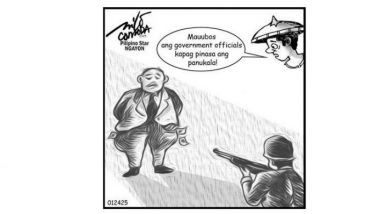CPP leader nabbed amid start of peace talks
ANGELES CITY, Philippines – Troops and police captured a top communist rebel in Baliuag, Bulacan on Valentine’s Day.
Alan Jazmines, a member of the Communist Party of the Philippines (CPP) central committee, is now detained in Camp Crame in Quezon City.
Jazmines was arrested on the strength of 13 warrants of arrest for murder and rebellion issued by the Quezon Regional Trial Court Branch 63 and the Lucena City Regional Trial Court Branch 59, according to Armed Forces Northern Luzon Command chief Lt. Gen. Gaudencio Pangilinan.
The CPP has demanded the immediate release of Jazmines on grounds that he is a consultant of the National Democratic Front (NDF) in peace negotiations.
“The arrest of Jazmines was carried out treacherously as formal peace negotiations between the NDF and the Government of the Philippines are about to resume in Oslo, Norway,” the CCP said.
“In arresting Jazmines, the Armed Forces of the Philippines and the Philippine National Police grossly violated the JASIG (Joint Agreement on Safety and Immunity Guarantees) and has shown utter contempt of the peace negotiations.”
However, presidential spokesman Edwin Lacierda said Malacañang expects the NDF to raise the JASIG issue regarding Jazmines during the peace talks in Norway.
“It will be a good means to verify his name under the JASIG agreement,” he said. “So he can avail of the process where we can verify where he is covered or not. It’s up to them and we will verify through the process.”
Armed Forces spokesman Brig. Gen. Jose Mabanta Jr. said Jazmines must prove that he is an NDF consultant.
“He needs to satisfy two things,” he said.
“The first is documentation. Does he have the documentation? Second, was he, at the time he was caught, in the performance of duties as part of the negotiating panel?
“Apparently he was not. So with that, we doubt if he can be released.”
However, Mabanta said the military will free Jazmines once they receive an order from the government peace panel.
“Yes, it really depends on them,” he said.
“But, however, they will also have to contend with the courts because he has pending cases.”
Army spokesman Col. Antonio Parlade Jr. said persons covered by the JASIG can be arrested if they are facing criminal cases.
“Being (part of) the JASIG list does not mean you are exempted from charges,” he said.
Parlade said they already expected the CPP to demand the release of Jazmines, who was arrested a day before the resumption of formal talks in Oslo, Norway.
“They (CPP) want to release all the persons we captured,” he said.
“The case (of Jazmines) was very specific. It’s murder.”
In a statement, Armed Forces chief Gen. Ricardo David said Jazmines must stand trial for rebellion.
“The arrest of Alan Jazmines will definitely affect the organizing, deception and propaganda efforts of the (party) against the Filipino people,” he said.
“Arrests of this kind will continue as we move on to achieve the country’s goal of reducing the enemies of the country’s citizens.”
On the other hand, the NDF warned that the arrest of Jazmines could disrupt the peace talks in Norway.
“Jazmines is covered by protection of the Joint Agreement on Security and Immunity Guarantees,” the NDF said in a statement.
“(Chief rebel negotiator Luis) Jalandoni said the arrest of Jazmines is an attempt by the (military and police) to disrupt the peace negotiations which are about to be resumed.”
The government and communist rebels meet near Oslo Tuesday for their first peace talks in six years.
Norway on Monday described the new closed-door talks as “a breakthrough” in efforts to end a conflict that has continued for more than 40 years.
Deputy foreign minister Espen Barth Eide will open negotiations at a hotel on the outskirts of Oslo at around 10 a.m. Tuesday with a few comments to journalists.
But the talks themselves, focusing on economic and social reform – in particular the agrarian reform called for by the communists – will be off-limits to the press.
A press conference is scheduled for the final day of the talks next Monday.
Meanwhile, the Philippine ambassadors and chargé d’affaires in 11 countries in Europe assured yesterday Presidential Adviser on the Peace Process Teresita Quintos-Deles of their eagerness to play a proactive role in the peace process.
Deles, who met with the ambassadors in Brussels, emphasized the crucial role of the Department of Foreign Affairs (DFA) in transmitting updates and information to the Philippine missions abroad.
“They look forward to more frequent exchanges through email communications with me,” she said.
Deles said the ambassadors, who include Teresita Barsana in Lisbon, Portugal; Maria Zenaida Angara-Collinson in Sweden; Ma. Theresa Lazaro in Berne, Switzerland; Romeo Manalo in Rome, Italy; Monina Estrella Callangan-Rueca in Hungary; Rora Navarro-Tolentino in Paris, France; Carlos Salinas in Madrid, Spain; Ma. Angelina Sta. Catalina in Helsinki, Finland; Lourdes Yparaguirre in Vienna, Austria; and the chargés d’affaires in Bucharest, Warsaw, The Hague, Dublin, Berlin and Prague, showed high level of appreciation on their meeting.
“Judging from the number of questions and the interest generated by the dialogue, you can tell there is a high level of appreciation from everyone for this substantive and insightful exchange,” Ambassador to Brussels Enrique Manalo said.
Deles related the importance of having a two-way dialogue, especially with the Philippine ambassadors as the peace process and foreign relations policy are very much linked.
“Violence and conflicts cross national boundaries, and the Philippine case has especially generated great interest from international players, some of whom have become a part of our country’s architecture for peace,” she said.
Deles said the Philippine embassies, especially in European Commission countries, have a role to play other than just provide logistical support to delegations from the country.
“Ambassadors from your countries of assignments go to me to get updates. I thought it is high time that we, too, should get a discourse going on matters of peace and foreign policy,” she said.
Deles said the dialogue, which took nearly seven hours, involved exchanges related to the peace talks with the MILF and the CPP, and the continuing discussions with the MNLF, the CPLA, and the two factions of the RPMP-RPA-ABB on the completion of the peace talks, and PAMANA as the government’s framework for sustaining all ongoing governance and development initiatives on the ground.
“There was interest in specially helping generate more resources for PAMANA,” she said.
“The prospect for peace has never been this good. It is better than it has ever been because of the political climate and the leadership now, there is hope.” — Ding Cervantes, Alexis Romero, Cecille Suerte Felipe, Delon Porcalla, Jose Rodel Clapano, Cesar Ramirez, Rhodina Villanueva, Ric Sapnu, Charlie Lagasca
- Latest
- Trending





























